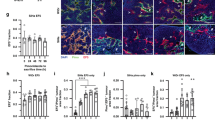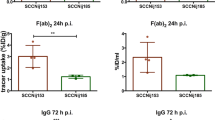Abstract
The serum concentrations of the radiosensitizer metronidazole have been determined in mice for both oral and intraperitoneal doses of the drug and these have been related to radiosensitization studies in murine tumour systems. In preliminary work before a possible clinical trail the serum metronidazole concentration/time curves have been determined in 7 patients using single doses of metronidazole of up to 15 g. The data suggest that a linear relationship exists between the metronidazole dose expressed in mg/kg and the peak serum concentration. The possibility of achieving radiosensitization of tumours in patients after tolerable doses of metronidazole is discussed in relation to enhancement ratios determined for in vitro and in vivo systems. It is concluded that predictions from in vitro systems give values that are probably too optimistic.
This is a preview of subscription content, access via your institution
Access options
Subscribe to this journal
Receive 24 print issues and online access
$259.00 per year
only $10.79 per issue
Buy this article
- Purchase on Springer Link
- Instant access to full article PDF
Prices may be subject to local taxes which are calculated during checkout
Similar content being viewed by others
Rights and permissions
About this article
Cite this article
Deutsch, G., Foster, J., McFadzean, J. et al. Human studies with "high dose" metronidazole: a non-toxic radiosensitizer of hypoxic cells. Br J Cancer 31, 75–80 (1975). https://doi.org/10.1038/bjc.1975.9
Issue Date:
DOI: https://doi.org/10.1038/bjc.1975.9
This article is cited by
-
Changes in membrane-bound hydrolases by metronidazole in rat renal brush border
Research in Experimental Medicine (1992)



